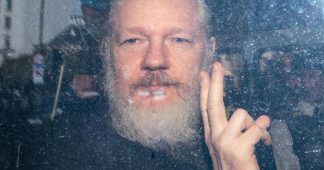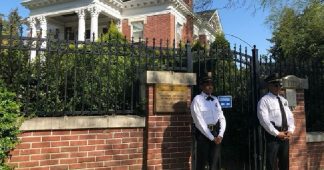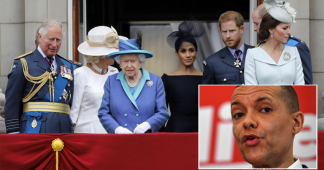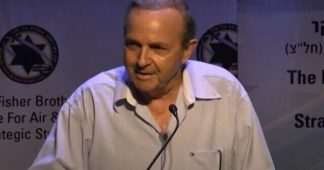by Mohamed Elmaazi
Mar. 6, 2021
© Photo : Mohamed Elmaazi
Anne Sacoolas was actually working for a US intelligence agency at the time that she killed 19-year-old Harry Dunn, whilst she was driving on the wrong side of the road in the East Midlands of England. Radd Seiger explains the significance of this fact in an exclusive interview with Sputnik.
Radd Seiger is an advisor and spokesperson for the family of Harry Dunn and is a lawyer by training. He has known the Dunn family for 20 years, including their son Harry, and lives just down the street from their home. Anne Sacoolas, a US citizen, killed Harry whilst she was driving down the wrong side of the road. Three weeks later, Mrs Sacoolas fled to the United States, after the UK Foreign Office advised police that she had diplomatic immunity, owing to the fact that she was a dependent of her husband Jonathan. However, this determination has recently been thrown into doubt, following the revelation that Mrs Sacoolas was herself working for US intelligence at the time.
In a detailed interview with Sputnik, Seiger explains why it is that, if Mrs Sacoolas was working in the UK as an intelligence officer, the Dunn family argue she did not have diplomatic immunity and she should not have been permitted to leave the country.
Sputnik: During a hearing in the case that the Dunn family has brought in the United States it was revealed that that Anne Sacoolas, the woman who killed Harry while she was driving on the wrong side off the road near a US Air Force base, in Northamptonshire, England, in August 2019, was actually an intelligence officer. you describe what exactly it is that you discovered in relation to this and how this came about?
Radd Seiger: Yes. So, the parents are pursuing a claim for wrongful death against Mrs. Sacoolas and her husband Jonathan, following Harry’s loss. And that’s in the senior courts in Virginia, in the United States. And at a hearing on February the third, the Sacoolas’ were trying to dismiss that claim and argued that it should not be dealt with in Virginia, but it should be dealt with in England where the crash happened. That is a perverse argument because plaintiffs largely are entitled to bring proceedings in the court of their choosing. And they decided to do this as a last resort, because they were struggling to get justice, for Harry in this country. And Mrs Sacoolas and her husband had chosen to base themselves in Virginia. So absolutely the logical place to bring the case.
Judge [Thomas Selby] Ellis, one of the most famous judges in the United States, heard that case, sided with the parents and took very little time to make his decision. In the process of hearing oral argument, he pressed the Sacoolases’ his lawyer about, you know, why this was even happening in the first place. And who was she? And was she working at the time? And as lawyers our first duty is to the court. You cannot mislead the court. So if a judge asks you a direct question, you’ve pretty much, as a lawyer, got to be honest. And this was in the first few minutes of the hearing and Mrs. Sacoolas’ lawyer replied that she was working at the time for the United States intelligence agencies. And that that was a factor in why she left the country. Now we had suspected all along, many whistleblowers, many people have come forward to tell me, that she had been working at the time, but we had never been able to prove it. So, it was absolutely shocking to hear those words come out of, not from a journalist, but from her own lawyer in open court. And it was an astonishing moment in the long pursuit of justice.
Sputnik: And it was already known that Ms Sacoolas’ husband, Jonathan, was also operating as an intelligence officer when he was based in the UK. Is that correct?
Radd Seiger: That’s right. And the relevance of this issue is, under the legal arrangements governing the space between the two countries, that date back to the nineties, the British government at the time were very concerned about these State Department employees, let’s call them, running around rural South Northamptonshire, in a driving environment they’re not familiar with, and could potentially cause a lot of harm. So, the agreement was struck that any diplomatic immunity that they had would be pre-waived. So, before they arrived [to the UK]. So Jonathan Sacoolas was working at the time, he was a registered as working at the time, and had he killed Harry that night, he would not have had diplomatic immunity and he would have gone on to be prosecuted. The issue is whether or not you’re working at the time as to whether you come under the protections afforded under the legal arrangements.
So all along, we’ve been told that Anne Sacoolas was merely a dependent of her husband, Jonathan, and as such, because she wasn’t working, her immunity was not pre-waived. Dependents were not specifically mentioned in that agreement. She was allowed to leave the country and walk away. So it’s important that we get to the bottom of this and understand whether or not her claim to diplomatic immunity is valid. Now it’s the parent’s position that she does not have diplomatic immunity. It’s the position of the Crown Prosecution Service that she did not have diplomatic immunity at the time of the crash. And yet the British government strongly argue that she did as of course do the U S government. So there’s a major dispute on it, but now it’s out in the open that she was working in the United Kingdom, deep undercover and seemingly not even the British government were aware of that and they did not become aware of that until sometime after she left. So, it raises all sorts of wider concerns. If you’re a citizen living in this country about, you know, a foreign government employees being here, and what are they doing, that’s really of no interest to the parents. Others will obviously be very interested in that, but our issue is did she have diplomatic immunity or not?
Sputnik: This is quite significant, isn’t it? Because there has been a recent court decision here in England where the Dunn family was challenging the legal basis and for the advice that was given to the police by the Foreign Office that Mrs. Sacoolas had diplomatic immunity and so therefore had to be permitted to leave back to the United States. It would appear now that however that advice may have been interpreted at the time, based on what you’re saying, if she was in fact an intelligence officer, which means she was working, according to the rules of this country and the agreement signed with the United States, then her immunity would have been waived as well. Is that correct?
Radd Seiger: That’s precisely correct. Now, our concern is that… — the case that you’re referring to is what’s called a judicial review in this country, where the courts will review a decision made by a government department. And that case took about a year to come to court. And none of this was brought to our attention or discussed or referred to the judges. Now, look, it’s ultimately up to the courts in this country to decide whether Anne Sacoolas had diplomatic immunity or not. We are still in dispute with the government because that ruling has been appealed to the next court up, to the Court of Appeal. Now, ultimately, I can’t stand here hand on heart and say for sure that this changes everything, but it’s our legal position that it does… and at the very least should be explored by the judges in the Court of Appeal and if necessary in the Supreme Court. So, the British government argue that the fact that she was nominated as a dependent by the sending state, in this case the United States, is what’s important under the Vienna Convention for diplomatic relations. So, she was nominated as a dependent. The fact that she then came to work here, and we don’t know what she was doing we know she was working for the intelligence agencies, the British government say is totally irrelevant. It’s the notification of your status. That they say is important. And we’re obviously very keen to challenge that position.
Sputnik: If the British government’s position is allowed to stand, that would mean that there would be a way for intelligence officers to circumvent the waiver that had been negotiated or agreed upon in the nineties, the immunity waiver, simply by nominating people as dependents so that they can both be undercover and have the protection of diplomatic immunity.
Radd Seiger: You’re absolutely correct, but I’ve had very many senior sources in Washington explain to me that that is in fact what may be happening here and happens unbeknownst to us far more often than any of us would care to think about; where a couple, in this case a married couple, come abroad to work. One is registered officially, but the other is not. To perhaps, as you said, and I think that the correct word is to circumvent the agreement. Now, if that’s the case that would obviously be deeply disturbing. I can’t prove that that’s the case, but, you know, that very question that you just posed must be asked in an inquiry going forward, because if that’s the case there’s something terribly wrong.
Let’s not get too bogged down in the detail of this, because at the heart of this is a really simple case of a tragic road crash. And the CPS have charged her with dangerous driving and in most civilised, law and rules-based countries, you do not get to kill somebody and walk away. And that’s exactly what the US government are seeking to do here, is to give her safe passage away from what she did. Had you and I had done this in Washington and killed an American child, well, we all know exactly what would happen. They would not tolerate it. And we won’t tolerate it. And I dare say, not only now my not only speaking for Harry’s family, but I think speaking for the British nation and the overwhelming majority of our American friends who look at this very simple case aghast and can’t understand why they’re even doing this.
Sputnik: It’s my understanding that when British diplomats have had immunity in the United States and that immunity was requested to be waived, it had to been waived by the British state. Is that accurate?
Radd Seiger: It absolutely accurate. So, we asked this question of the Foreign Office ourselves, since 1999 there have been, I believe, 13 cases, of British diplomats in the United States, breaking American laws. And here the British government are to be congratulated because it’s British foreign policy to waive immunity, instantaneously, immediately, to ensure that justice can be done for the benefit of the citizens of the host country. And the reason they do that is because there is a specific article in the Vienna Convention which requires diplomats to respect the laws of the host nation. So, the United Kingdom follows the Vienna convention, in letter, but also in spirit. And we’ve all learned to our horror that the United States takes a completely different approach in terms of protecting its citizens abroad.
And we all know that America likes to base itself in many parts of the world, occupy foreign countries, and we have thousands of American service personnel here, many other countries around the world too. And these people sometimes do very bad things, and it just seems to be a longstanding State Department policy to never ever waive diplomatic immunity. Now, in my judgment, that’s not acceptable. Harry was a totally innocent British citizen as are his family, and the Americans are seeking to deprive them of their right to justice and inalienable right to justice. And we often hear the Americans talking about how proud they are of their human rights record. And in fact, try to teach the rest of us around the world how to behave. Well, they’ve lost all moral standing, in that sense. And I think this case is a very high-profile case, America just seems to have lost its way and we will not stand for it.
Sputnik: And, as you say, it may well be, it certainly looks like Mrs. Sacoolas didn’t have diplomatic immunity to begin with because she was working as an intelligence officer. But to get to the final question, can you explain briefly what it is that the Dunn family are hoping to achieve via the wrongful death suit in the United States?
Radd Seiger: Yeah, so this is a claim for damages after Harry’s death. It’s not something that the parents ever wanted to do. So, they only took this course of action, following strong advice from our lawyers in America. And it’s, you know, in our country, there are two forms of justice. One is civil and the other is criminal. The parents are now pursuing, their rights through the civil justice system, as well as ensuring that the criminal justice system is allowed to play its role here. But the primary purpose of it is to get answers and to get full disclosure, from both Mrs Sacoolas and her husband, Jonathan, and he was present at the scene of the crash that night as well. And for them to give testimony under oath, in what’s called a deposition in the United States where they have to come into our lawyer’s office and answer questions under oath.
Look, I mean, you know, it breaks my heart that here we are 18 months after Harry died and the parents still don’t know what happened to him that night, what words he said, we know he was fully conscious for a long time. Almost every bone in his body was broken. So, you can imagine how much pain he would have been in. And yet, because they’ve been deprived of justice, they do not have a good idea of what happened that night. So, the main purpose of it is to ensure that the Sacoolases give a full account, under oath, of what they were doing. And for instance, we know that Mrs Sacoolas did not call 999, in this country that’s the emergency number that you call. We wanna know why she didn’t do that. Our lawyers are busy preparing to interrogate her and her husband as we speak.
Sputnik: Radd, thank you very much for joining us on Sputnik international.
Radd Seiger: Thank you.
Published at sputniknews.com











